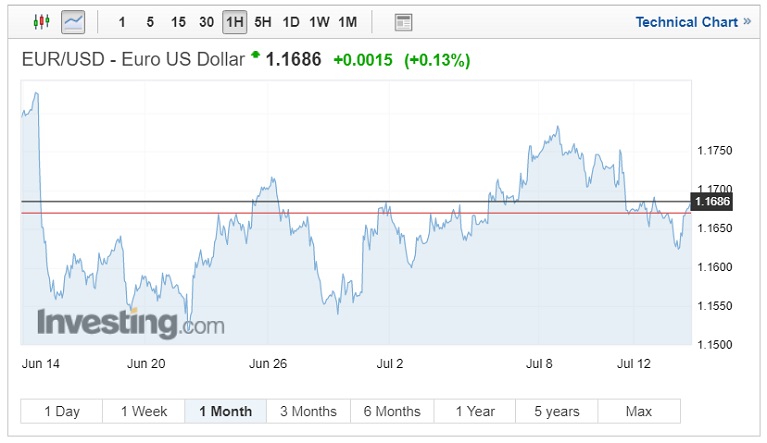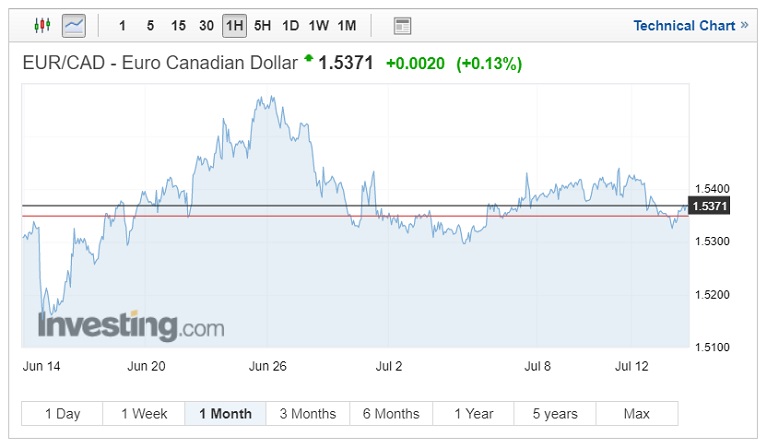This week’s data bolstered the Euro, inflation would have now appeared to have turned a corner registering the highest level since April last year. The indicators have caused some ECB members to highlight that a rate rise should be implemented sooner than next year, contradicting Mario Draghi’s slow and steady, softly-softly approach.

Inflation moving towards 2%
Eurozone inflation is now moving toward the ideal 2% ticking a significant box from the European Central Banks wish list. Annually Inflation reached 2% in June, the regions statistics office highlighted the highest inflation levels since April. A significant part of the rise in Eurozone inflation has been attributed to oil prices with Year on year pricing seeing increases of roughly 8%. A figure which has increased by 1.9% from May, demonstrating the growth seen in the last month.
The European Central Bank will be able to draw a lot of confidence from the rise in interest rates. The ECB are finally seeing a return on the policy that they implemented more than three years ago when they opted to cut interest rates to under 0% and started their asset purchasing strategy.
Oil prices have risen consistently this year rising from $46 and topping $74 dollar. Periodic tightening and supply issues should ensure that this trend continues and therefore Eurozone should be sustainable for the foreseeable. Especially if the US continues down the route of protectionism and continues with tariffs.
Merkel speculation settles
The coalition just a few weeks ago had been in a state of tatters due to conflict on a number of points, the most poignant being immigration. Following the recent migration being signed by the 27 EU nations, Merkel had the task of seeking approval from her coalition government.
The ensuing negotiations threw the coalition into further turmoil when Horst Seehofer, the interior minister offered his resignation. Mr Seehofer was willing to step down as interior minister and chair of the Christian Social Union (CSU).
Seehofer demanded that Merkel implements stricter rules on immigration and contrarily to Merkel’s open-door policy desired the ability to turn immigrants away at the border.
There has however since been a glimmer of hope in the form of a dulled down immigration policy which has offered much need stability to Merkel’s government.
The proposed transit camps which were pivotal to the EU’s new immigration policy, in order to house immigrants wishing to cross borders or seek asylum. Instead of the proposed camps or centres, the German government is now suggesting using existing police stations, however, they only anticipate handling 5 cases a day.
Germany only plans to turn away immigrants that are already registered in another EU country, providing a joint agreement is held between Germany and the other country in order to deport.
Merkel’s primary coalition partner the Left Social Democrats have reportedly now approved the migration bill and for the time being, at least, a key point of conflict for the coalition appears to have been pacified for the time being.
ECB members say 2019 interest rate is too late
Whilst investors are betting on a move a Euro interest rate rise in autumn next year it has emerged that many MPC believe that next year might be too late.
Their rational currently being supported by marco economic data from Europe. Inflation seems sustainable and other indicators also point to a rate rise sooner than next year. The zone has also been boosted by German factory orders which surged significantly in May.
At the same time, the ECB are unlikely to divert from their plan the tone is key. Last month the European central bank confirmed that the rates will remain unchanged until “at least through summer of 2019”.
Policy members believe that the temporary lull seen at the beginning of the year is now over and therefore a rate rise should be considered sooner.
Euro exchange rate performance
The Euro despite political uncertainty in Germany has prospered. It appears although clandestine, that many ECB members are calling for rate changes soon than next year. Whilst I find it unlikely that the current plan will be diverted away from this will undoubtedly support the Euro.
The EUR/USD pair has managed to claw back much of its losses seen in mid-June and over the last few weeks has gained. The pair coming back from a month low of 1.1519 and touching a high of 1.1783 on the 9th of June. Undoubtedly assisted by the speculation surround a potential trade war which typically triggers a dollar weakness.
Likewise, the EUR/CAD has broadly traded higher over the calendar month. The Canadian Dollar despite rising oil prices has stuttered thanks to continual uncertainty and back tracking on NAFTA. Trump has taken an inconsistent and aggressive approach on NAFTA and tariffs. The Bank of Canada’s rise only really served to steady the Canadian Dollar.
The EUR/CAD in similar fashion the EUR/USD enjoying progress over the last month. Mid-June saw a low of 1.1553, with the monthly high being 1.5556. In terms of trading, the pair over the year has been much more volatiles then EUR/USD seeing an annual change of 6% v 2.52% for the Euro Dollar.

